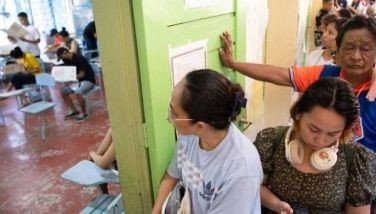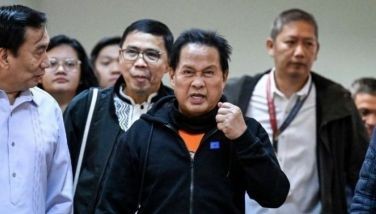The man in the street

August 6, 2005 | 12:00am
One of the scenes in the light and sound history of the Philippines in Intramuros shows an indifferent public watching the execution of Jose Rizal in Bagumbayan. The commentator tells us that the watchers, ordinary Filipinos, did not cheer or jeer. They just stood to watch and wait before taking sides. Only when the execution was done with and a half-hearted Viva Espana did the crowd disperse. They may have waited for a signal that would finally tell them who was the victor before committing themselves to fight an obvious violation of human rights. That is true then as it is today.
That is why a survey cannot be relied upon as the basis for what is obviously a leadership issue. The recent survey demonstrates yet again that a survey is useless as a basis for promoting or rejecting charter change. The masses, no less than a segment of the elite cannot judge an issue that they know nothing about. It is true of even more sophisticated countries. As a German friend told me, if we had relied on surveys of the man in the street, there would be no reunification or EU to speak of.
It is a fact that ordinary individuals, (the proverbial man in the street), are conservative at heart whether in Bagumbayan or in Europe today. SWS may make a lot of noise about its being ‘non-commissioned’ but that does not absolve it from being suspect. The question remains: what exactly was the survey trying to find out?. It seems to me that to ask "if charter change will enable former presidents to become prime ministers in parliament, would you agree?" is a loaded question to elicit rejection. It tells us all. SWS is politicking. It is not really interested in finding out just what the people want.
Moreover the survey starts from the premise that the people understand charter change and how it will affect their lives. The fact is they don’t. If that is what SWS was trying to find out, let us not say just 70 percent but 95 percent of Filipinos do not know charter change that would enable them to judge per se whether the country needs it or not.
I have no problem with surveys if they are honestly conducted but to ask the questions that SWS did (at least those which I read of) and then say that ‘people see no need for charter change’ is both cynical and dishonest. The issue of charter change cannot be encompassed in a survey even if it uses the most scientific tools. Indeed that is why we are amending, the 1987 Constitution drafted by a Cory-selected commission. It was ratified by an overwhelming majority, but one month later when the same electorate was asked why they did, the answer was they did not know. By the way, this was told to me by Pulse Asia’s Professor Miranda.
We could go on and on about it but survey groups are doing a disservice to the country when they use their surveys for politicking.
We do not begrudge SWS or Pulse Asia for making a living out of these surveys. But it is just as urgent that we reply immediately to the false image they create about charter change even if it favors their well-heeled clients. I would have been more impressed if SWS had conducted its non-commissioned survey during a period of quiet when it cannot have been accused of ulterior motives. Moreover, in an honest effort to find out just how the ordinary man in the street responds to charter change we would need a different set of questions.
I am sure that the answers would have been totally different if the survey had asked "if charter change will bring about less politics and a more stable economic atmosphere and give more jobs to Filipinos, will you be for charter change?" It is not true only in the Philippines that the question of a ‘democratic’ assessment of a political issue can be so distorting and damaging .
The most recent example is the French referendum on the EU Constitution. The new constitution reflected the consensus among leaders that a closer knit Europe would be desirable and make the union stronger. It would be an important counterpoint in a world dominated by a single superpower. But that was not to be. Voters were more concerned with jobs and were afraid that voting yes to the new constitution would open the doors to East European immigrants.
What is clear to me is that it is not only the ordinary man in the street which needs educating but also more informed citizens like poll surveyors. It is time to free the Filipino nation from the shackles of irrelevant surveys.
THE TEVES PLEBISCITE. Another version of this dependence on the man in the street to be wise and fit to judge an issue as complex as charter change is the Teves proposal for a plebiscite before Congress proposes the changes. Unfortunately this is passing the buck. The onus of leadership rests on elected members of Congress and the Constitution clearly mandates them to propose the amendments not to the people.
They merely ratify through a plebiscite.
Still, I can understand Teves’s concern that if a plebiscite were not conducted beforehand, we may not get the people’s approval in a referendum. That means changing the Constitution without going through the process of amendment. It is not the job of Congress to anticipate the results of a plebiscite before proposing changes that are good for the country. There will be many ifs and buts about the issue but in the end we would do well by strictly observing what the Constitution says.
Like the SWS survey, the Teves plebiscite takes for granted the fundamental issue of concern and why we have to restructure government. The masa do not understand charter change per se but they know something is wrong when their need for jobs, food on the table, and health care are not being addressed. A better life for the masses is envisioned with charter change. That is the message that we must get through.
I hasten to add charter change is not a catch all vehicle of reform. It never was. But it will certainly address the problem of how a one man, one vote in national elections has deteriorated into popularity and money contests.
Still the Teves argument is useful because it spurs advocates to work harder to inform the public as best they can. In this effort we will need all the help of local authorities, which in the end, hold the key to the masa.
I understand that town meetings down to the level of barangays will be held within the month to explain charter change to the masa in the language they will understand – charter change for a better life. But holding wide ranging consultations with the people is not the same as making the proposed issues subject to a plebiscite even before these have been cobbled by Congress.
My e-mail is cpedrosaster@gmail.com
That is why a survey cannot be relied upon as the basis for what is obviously a leadership issue. The recent survey demonstrates yet again that a survey is useless as a basis for promoting or rejecting charter change. The masses, no less than a segment of the elite cannot judge an issue that they know nothing about. It is true of even more sophisticated countries. As a German friend told me, if we had relied on surveys of the man in the street, there would be no reunification or EU to speak of.
It is a fact that ordinary individuals, (the proverbial man in the street), are conservative at heart whether in Bagumbayan or in Europe today. SWS may make a lot of noise about its being ‘non-commissioned’ but that does not absolve it from being suspect. The question remains: what exactly was the survey trying to find out?. It seems to me that to ask "if charter change will enable former presidents to become prime ministers in parliament, would you agree?" is a loaded question to elicit rejection. It tells us all. SWS is politicking. It is not really interested in finding out just what the people want.
Moreover the survey starts from the premise that the people understand charter change and how it will affect their lives. The fact is they don’t. If that is what SWS was trying to find out, let us not say just 70 percent but 95 percent of Filipinos do not know charter change that would enable them to judge per se whether the country needs it or not.
I have no problem with surveys if they are honestly conducted but to ask the questions that SWS did (at least those which I read of) and then say that ‘people see no need for charter change’ is both cynical and dishonest. The issue of charter change cannot be encompassed in a survey even if it uses the most scientific tools. Indeed that is why we are amending, the 1987 Constitution drafted by a Cory-selected commission. It was ratified by an overwhelming majority, but one month later when the same electorate was asked why they did, the answer was they did not know. By the way, this was told to me by Pulse Asia’s Professor Miranda.
We could go on and on about it but survey groups are doing a disservice to the country when they use their surveys for politicking.
We do not begrudge SWS or Pulse Asia for making a living out of these surveys. But it is just as urgent that we reply immediately to the false image they create about charter change even if it favors their well-heeled clients. I would have been more impressed if SWS had conducted its non-commissioned survey during a period of quiet when it cannot have been accused of ulterior motives. Moreover, in an honest effort to find out just how the ordinary man in the street responds to charter change we would need a different set of questions.
I am sure that the answers would have been totally different if the survey had asked "if charter change will bring about less politics and a more stable economic atmosphere and give more jobs to Filipinos, will you be for charter change?" It is not true only in the Philippines that the question of a ‘democratic’ assessment of a political issue can be so distorting and damaging .
The most recent example is the French referendum on the EU Constitution. The new constitution reflected the consensus among leaders that a closer knit Europe would be desirable and make the union stronger. It would be an important counterpoint in a world dominated by a single superpower. But that was not to be. Voters were more concerned with jobs and were afraid that voting yes to the new constitution would open the doors to East European immigrants.
What is clear to me is that it is not only the ordinary man in the street which needs educating but also more informed citizens like poll surveyors. It is time to free the Filipino nation from the shackles of irrelevant surveys.
They merely ratify through a plebiscite.
Still, I can understand Teves’s concern that if a plebiscite were not conducted beforehand, we may not get the people’s approval in a referendum. That means changing the Constitution without going through the process of amendment. It is not the job of Congress to anticipate the results of a plebiscite before proposing changes that are good for the country. There will be many ifs and buts about the issue but in the end we would do well by strictly observing what the Constitution says.
Like the SWS survey, the Teves plebiscite takes for granted the fundamental issue of concern and why we have to restructure government. The masa do not understand charter change per se but they know something is wrong when their need for jobs, food on the table, and health care are not being addressed. A better life for the masses is envisioned with charter change. That is the message that we must get through.
I hasten to add charter change is not a catch all vehicle of reform. It never was. But it will certainly address the problem of how a one man, one vote in national elections has deteriorated into popularity and money contests.
Still the Teves argument is useful because it spurs advocates to work harder to inform the public as best they can. In this effort we will need all the help of local authorities, which in the end, hold the key to the masa.
I understand that town meetings down to the level of barangays will be held within the month to explain charter change to the masa in the language they will understand – charter change for a better life. But holding wide ranging consultations with the people is not the same as making the proposed issues subject to a plebiscite even before these have been cobbled by Congress.
BrandSpace Articles
<
>
- Latest
- Trending
Trending
Latest
Trending

By IMMIGRATION CORNER | By Michael J. Gurfinkel | 6 hours ago

By BABE’S EYE VIEW FROM WASHINGTON D.C. | By Ambassador B. Romualdez | 6 hours ago

By Lucas P. Bersamin | 1 day ago
Latest
Recommended

May 24, 2025 - 11:53am

May 23, 2025 - 8:54am

























